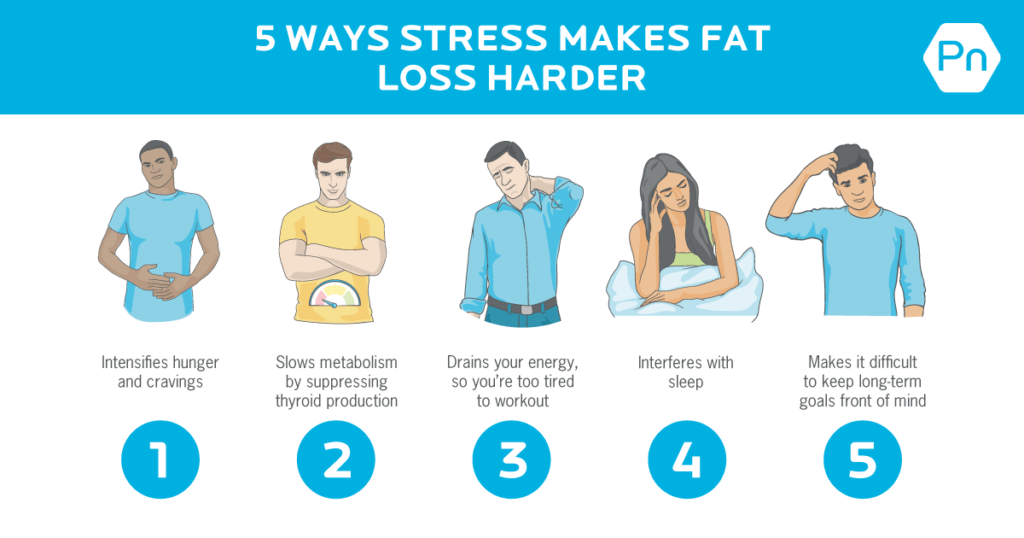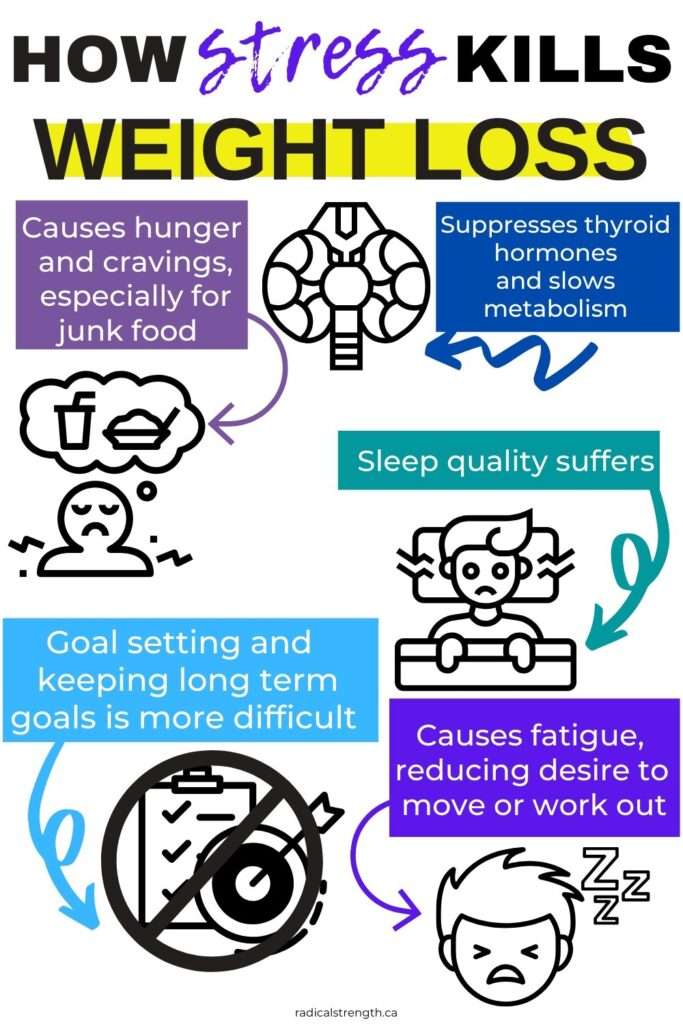Have you ever wondered how stress can affect your weight loss journey? It’s a common question that many people have, and it’s one that’s worth exploring. Stress, as we all know, can have a significant impact on our overall health and well-being. But what about its specific influence on weight loss? In this article, we’ll delve into the effects of stress on weight loss and how it can potentially hinder your progress. So, if you’re looking to shed those extra pounds, keep reading to learn more about this interesting topic.
When it comes to weight loss, stress can be a major obstacle. One of the ways stress affects our bodies is by increasing the levels of cortisol, also known as the stress hormone. High levels of cortisol can lead to weight gain, especially around the abdominal area. Additionally, stress can also disrupt our sleep patterns and lead to emotional eating, both of which can further hinder our weight loss efforts. Understanding the impact of stress on weight loss can help us develop strategies to manage it effectively and achieve our goals.
In this article, we’ll explore the various ways in which stress can interfere with weight loss. From its effects on our hormones to its influence on our eating habits, we’ll cover it all. We’ll also provide you with useful tips on how to reduce stress and stay on track with your weight loss journey. Don’t let stress sabotage your progress – equip yourself with the knowledge to overcome it and reach your desired weight. Let’s get started on understanding the impact of stress on weight loss.
So, if you’re ready to take a deep dive into the topic and gain valuable insights, keep reading. In the next sections, we’ll explore the mechanisms behind stress-induced weight gain, the role of stress hormones, and how to effectively manage stress to support your weight loss goals. By the end of this article, you’ll have a better understanding of how stress can affect your weight loss journey and the steps you can take to mitigate its negative impact. Get ready to conquer stress and reach your weight loss goals once and for all!

Understanding Stress and Weight Loss
The Concept of Stress
Stress is a natural response that our bodies have to certain situations or events. It can be caused by various factors, such as work pressure, financial difficulties, relationship problems, or health issues. When we experience stress, our bodies release hormones like cortisol, which can have both physical and psychological effects.
The Relationship Between Stress and Weight Loss
Weight loss is a goal for many people, but sometimes it can be more challenging than anticipated. Stress plays a significant role in this process, as it can affect our behaviors, hormones, and even our metabolism. Understanding the impact of stress on weight loss is crucial for developing effective strategies to overcome these challenges.
How Stress Affects Weight Loss
Stress can impact weight loss in several ways, affecting both our psychological and physical well-being. By understanding these effects, we can better address and manage stress to support our weight loss goals.
Psychological Effects of Stress on Weight Loss
Emotional Eating and Stress
When we are stressed, we may turn to food as a means of comfort or distraction. This is often referred to as emotional eating. People who engage in emotional eating tend to consume high-calorie, unhealthy foods in larger quantities. These behaviors can lead to weight gain and hinder weight loss progress.
Stress-Induced Hormonal Imbalances and Weight Gain
Stress can disrupt our hormonal balance, especially with the release of cortisol. Chronically high levels of cortisol can lead to weight gain, particularly around the abdominal area. This weight gain can make it more difficult to achieve weight loss goals.
Stress-Related Impaired Sleep and Weight Loss
Stress can also disrupt our sleep patterns, leading to inadequate or poor-quality sleep. Lack of sleep can affect our appetite-regulating hormones, such as leptin and ghrelin. It can also decrease our energy levels and motivation to engage in physical activity, ultimately impeding weight loss progress.

Physical Effects of Stress on Weight Loss
Increased Cortisol Levels and Weight Gain
Stress triggers the release of cortisol, often referred to as the “stress hormone.” Elevated levels of cortisol over time can lead to weight gain, particularly in the form of visceral fat. Visceral fat is associated with various health risks, including heart disease and type 2 diabetes.
Stress-Related Inflammation and Weight Loss Challenges
Chronic stress can also lead to inflammation in the body. Inflammation can interfere with the proper functioning of our metabolism, making it more difficult to lose weight. Additionally, inflammation can increase the risk of developing chronic diseases.
Effects of Stress on Metabolism and Energy Expenditure
Stress can impact our metabolism and energy expenditure. High levels of stress can slow down our metabolism, which can make weight loss more challenging. Moreover, stress can decrease our overall energy levels, reducing the motivation and ability to engage in physical activities necessary for weight loss.
Behavioral Impact of Stress on Weight Loss
Stress-Induced Sedentary Lifestyle and Weight Gain
Stress can cause us to adopt a sedentary lifestyle, where we engage in minimal physical activity. This lack of movement can contribute to weight gain and hinder weight loss progress. Breaking free from this sedentary cycle is essential for achieving weight loss goals.
Self-Sabotaging Behaviors and Stress
Stress can lead to self-sabotaging behaviors that undermine weight loss efforts. These behaviors can include overeating, indulging in unhealthy foods, skipping workouts, or neglecting self-care. Recognizing and addressing these behaviors is crucial for overcoming the impact of stress on weight loss.
Lack of Motivation and Psychological Stress
Stress can drain our motivation and make it difficult to stay committed to our weight loss goals. The psychological impact of stress can lead to feelings of overwhelm, lack of focus, and decreased willpower. Finding effective strategies to maintain motivation and overcome psychological stress is essential for successful weight loss.

Strategies to Manage Stress for Effective Weight Loss
Stress-Relief Techniques for Weight Loss
Incorporating stress-relief techniques into our daily routine can significantly impact weight loss success. These techniques can include meditation, deep breathing exercises, yoga, journaling, or engaging in hobbies that bring joy and relaxation. Finding activities that promote stress reduction can support our weight loss efforts.
Cognitive Behavioral Therapy and Stress Management
Cognitive Behavioral Therapy (CBT) is a therapeutic approach that can help individuals identify and modify negative thoughts and behaviors. Utilizing CBT techniques can help manage stress and develop healthier coping mechanisms, which in turn can positively impact weight loss.
Implementing Healthy Coping Mechanisms
Instead of turning to food for comfort during times of stress, it’s essential to implement healthy coping mechanisms. These can include exercising, spending time with loved ones, practicing mindfulness, or seeking support from a therapist or support group. Developing healthy habits to cope with stress can prevent weight gain and support weight loss efforts.
Balancing Stress and Weight Loss Goals
Setting Realistic Expectations
When it comes to weight loss, it’s important to set realistic expectations and avoid placing unnecessary pressure on ourselves. Recognize that stress can impact weight loss progress and allow for flexibility in your goals. By setting achievable milestones, you can maintain motivation and minimize the stress associated with weight loss.
Seeking Professional Support for Stress and Weight Loss
If stress is significantly impacting your weight loss journey, seeking professional support from a therapist, counselor, or registered dietitian can be beneficial. These professionals can provide guidance, strategies, and support tailored to your specific needs, helping you navigate the challenges of stress and weight loss.
Prioritizing Self-Care and Stress Reduction
Taking care of yourself and prioritizing stress reduction is crucial for successful weight loss. Incorporate self-care activities into your routine, such as getting enough sleep, eating nourishing foods, engaging in physical activity, and practicing relaxation techniques. By prioritizing self-care, you can better manage stress and support your weight loss goals.

Empowerment Through Knowledge: Stress and Weight Loss
Understanding Individual Stress Triggers
Everyone experiences stress differently. Understanding your personal stress triggers can help you identify patterns and develop effective strategies to manage stress. By recognizing what causes stress in your life, you can proactively work towards reducing its impact on your weight loss journey.
Identifying Personal Coping Mechanisms
Discovering healthy coping mechanisms that resonate with you is essential for managing stress and supporting weight loss. Experiment with different techniques, such as mindfulness, creative outlets, or physical activities, to find what works best for you. These coping mechanisms can help you navigate stress and minimize its interference with your weight loss goals.
Creating a Supportive Environment for Weight Loss
Surrounding yourself with a supportive network can significantly impact your weight loss journey, especially when dealing with stress. Seek out friends, family members, or support groups who understand and encourage your goals. Having positive influences can help you navigate stress and provide the support you need to achieve your weight loss goals.
Case Studies: Stress’s Impact on Weight Loss
Examining Real-Life Examples
Real-life case studies can provide valuable insight into the impact of stress on weight loss. By studying the experiences of others, we can learn from their successes and challenges, gaining inspiration and guidance for our own journeys.
Effects of Stress on Different Weight Loss Approaches
Different weight loss approaches may be more or less affected by stress. Understanding how stress impacts different strategies, such as calorie restriction, exercise, or specific diets, can help us tailor our approach and make adjustments as needed to overcome any barriers caused by stress.
Lessons Learned and Success Stories
By examining the lessons learned and success stories of individuals who have successfully managed stress while achieving their weight loss goals, we can gain valuable inspiration and practical tips. Hearing about the experiences of others can instill belief in our ability to overcome the impact of stress on weight loss.

The Importance of Mental Wellbeing in Weight Loss Journeys
Addressing Emotional Triggers
Addressing emotional triggers is crucial for managing stress and supporting weight loss. By identifying and addressing the root causes of emotional eating or self-sabotaging behaviors, we can develop healthier coping mechanisms that promote both mental and physical well-being.
Building Resilience and Mental Strength
Resilience and mental strength are essential for navigating the challenges of stress and weight loss. Building resilience involves cultivating a positive mindset, practicing self-compassion, and developing effective stress management techniques. These skills can help us bounce back from setbacks and maintain focus on our weight loss goals.
Overcoming Psychological Barriers to Weight Loss
Psychological barriers, such as negative self-talk, perfectionism, or fear of failure, can hinder weight loss progress. Recognizing and addressing these barriers is crucial for achieving long-term success. Seeking support from a therapist or counselor can provide valuable guidance in overcoming these psychological hurdles.
Conclusion
Understanding the impact of stress on weight loss is essential for developing effective strategies to manage stress and support our weight loss goals. By addressing the psychological, physical, and behavioral effects of stress, we can navigate the challenges that stress presents and achieve success in our weight loss journey. Remember, taking care of our mental well-being is just as important as focusing on our physical health when it comes to weight loss. With knowledge, support, and a proactive approach to managing stress, you can overcome its impact and achieve long-lasting weight loss.
